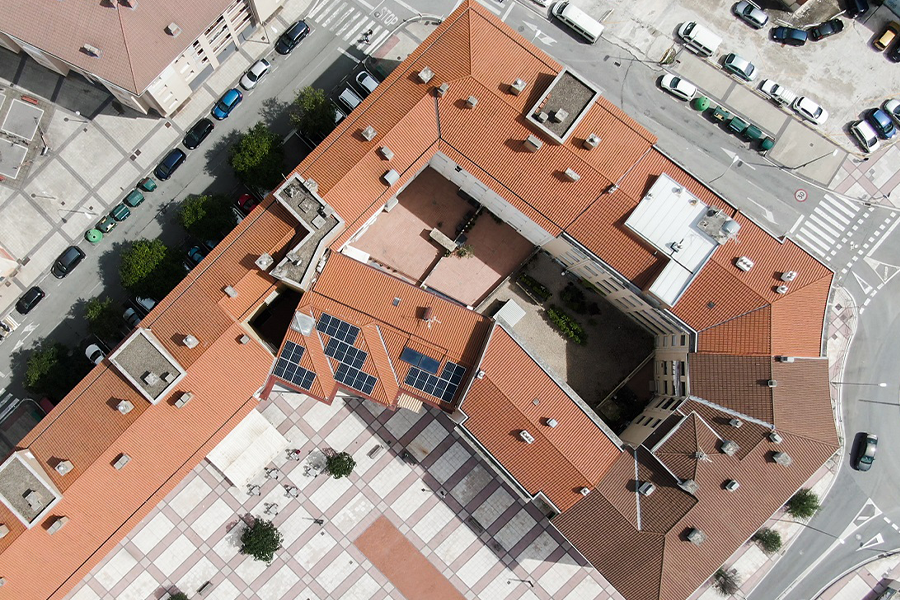Iberdrola España and the Virgen de la Peña school promote a pioneering solar community in Castilla y León
-
The new installation, the eighth in Castilla y León, will be located on the roof of this school and will prevent the emission of around 600 tonnes of CO2 into the atmosphere over the next 30 years
-
In addition to reducing the cost of the school's electricity bill, residents within a radius of 2 km will benefit from the advantages of renewable self-consumption, without any installation or investment
-
This initiative reflects the commitment to sustainability and energy transition of both entities

Iberdrola España and the Virgen de la Peña school in Bembibre (Educere Foundation) have joined forces to promote a pioneering solar community in the province of León in their commitment to sustainability and energy transition.
The new installation, Iberdrola España's second in the province and the eighth in Castilla y León, will be located on the roof of the Bierzo school and will prevent the emission of around 600 tonnes of CO2 into the atmosphere over the next 30 years.
In addition to reducing the cost of the school's electricity bill, residents within a radius of 2 kilometres will be able to benefit from the advantages of renewable self-consumption − without any installation or investment.
This form of community self-consumption allows users to share the 100% renewable energy generated from a single photovoltaic facility located on the roof of the DIY centre, in the vicinity of their home.
Iberdrola España is investing in this installation, which will consist of 176 solar panels, the total power will exceed 80 kilowatts (kW) − enough to produce around 107 megawatt hours (MWh) annually.
Thanks to this solar community, around 160 families will be able to participate in it and save on their electricity bills by consuming part of the energy produced locally by this facility. Virgen de la Peña school in Bembibre (Educere Foundation), a pioneer in implementing a renewable installation of these characteristics, will be able to cover up to 40% of its electricity consumption.
Furthermore, as a result of its commitment to self-consumption, Iberdrola España has improved the remuneration of its customers' surpluses. Thanks to innovation in energy products, self-consumers with Iberdrola España plans can value their surpluses beyond the energy − making it possible to have a bill of €0.
"This pioneering initiative is a very important milestone that marks Iberdrola España's commitment to innovation in energy solutions, sustainability and commitment to the areas in which we operate by making self-consumption available, in this case to 160 families in Bierzo", said Celiano García, Iberdrola España's Commercial Director in Castilla y León.
The school's principal Judit Yebra stresses that "this decision not only represents a step forward in terms of environmental responsibility, but also has significant benefits for our educational community. On the other hand, she points out that an installation as important as the one that is going to be carried out broadens the students' knowledge, encourages their interest in renewable energies and is in line with the school's commitment to educating students to be environmentally responsible".
Leader in self-consumption
Iberdrola España leads the photovoltaic self-consumption market in Spain, managing 40% of the country's self-consumption customers. As part of its commitment to accelerating the energy transition and developing new products to improve efficiency and energy savings, in 2015 the company became the first company in its sector to integrate self-consumption solutions into its range of services.
The collective self-consumption solutions developed by Iberdrola España have made self-consumption available to any customer − whether or not they have their own roof. Customers in this segment also benefit from the Solar Plan, a competitive electricity tariff during the hours when there is no sun, which is when they need to consume energy from the grid, as during the day they self-supply from their own installation.
Self-consumption solar systems can save 30% on annual bills in the case of residents' associations; 50% for companies and businesses; and up to 70% in single-family homes. These savings are produced in three ways: the energy produced by the facility that the user does not have to buy, compensation for the surplus energy not consumed that is fed into the grid, and savings due to lower taxes.











